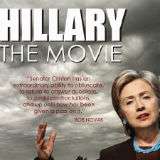Hillary Clinton Says Letting Activists Criticize Her 'Hollowed Out' Our Democracy
The presumptive Democratic presidential nominee thinks more speech makes elections less competitive.

Yesterday Hillary Clinton marked the sixth anniversary of Citizens United v. Federal Election Commission with a CNN essay reiterating her determination to overturn that Supreme Court decision, which lifted legal restrictions on political speech by unions and corporations. Clinton, the presumptive Democratic presidential nominee, says Citizens United "transformed our politics by allowing corporations to spend unlimited amounts of money to influence elections." She does not mention that the corporations include nonprofit advocacy groups across the political spectrum. In fact, she does not mention freedom of speech or the First Amendment at all, although she does claim that Citizens United "change[d] whose voices count in our democracy." Nor does Clinton mention that speech critical of her was at the center of the case, perhaps because it would be unseemly to say the Supreme Court should have allowed the FEC to suppress a movie that made her look bad—rather like Donald Trump praising Kelo v. New London, which allowed rich developers like him to acquire land they covet by using the government's eminent domain power.
Clinton's counterintuitive thesis is that allowing more campaign-related speech has made elections less competitive. She presents no real evidence to back up that claim, simply asserting that Republicans would not have done as well as they did in the elections that followed Citizens United if the Supreme Court had not rejected censorship of Hillary: The Movie. As Scott Shackford noted yesterday, there are more than a few examples of anti-establishment or otherwise marginal candidates who have been aided by independent spending, which seems to make elections more rather than less competitive. If Clinton had counterexamples of challengers who were stymied by sinister "outside groups," you'd think she would have mentioned one or two.
Instead Clinton complains that in 2014 "the top 100 donors spent nearly as much as all 4.75 million small donors combined." Does that mean Republicans are winning because they are outspending Democrats, or that "our democracy is being hollowed out," as Clinton claims? Not really. The Politico story to which she links, which analyzes contributions to candidates, parties, PACs, super PACs, and 527 groups, notes that "donors who gave exclusively or primarily to Democratic candidates and groups held down 52 of the top 100 spots—including by far the biggest donor of disclosed 2014 cash: retired San Francisco hedge fund billionaire Tom Steyer."
Politico also notes that spending a lot of money does not ensure victory. Larry Lessig's Mayday PAC "spent $10.6 million from a mix of micro- and mega-donors on a quixotic crusade to elect congressional candidates who it hoped would support policies that empower mom and pop contributors." The organization "suffered embarrassing disappointment in 2014, winning only two out of eight races in which it played." Steyer, the No. 1 donor in 2014, did not do so well either:
Steyer spent the majority of his political cash—$66.9 million—through a super PAC he created and funded to pursue his main issue: elevating climate change in the political debate. Yet the PAC, NextGen Climate Action, won only three of the seven races in which it spent cash, prompting grumbling from ostensible allies that he may have overestimated voters'—and his fellow liberal donors'—interest in the issue, and that he misspent his cash on sometimes bizarre ads accusing Republican candidates of being beholden to Big Oil and challenging the Koch brothers, whose multinational industrial conglomerate includes a substantial fossil fuel portfolio, to a debate on climate change.
In fact, "plenty of wealthy donors in recent years have gotten questionable returns on their donations," including supporters of "GOP-allied super PACs like Karl Rove's American Crossroads." So maybe money can't buy you love after all.
Since "only 0.28 percent of American adults donate to campaigns," the focus on big vs. small donors seems misconceived. If the health of our democracy were Clinton's real concern, she would ask about the diversity of viewpoints presented in elections and the ability of newcomers to challenge incumbents. Greater freedom of speech can only improve both.


Show Comments (132)